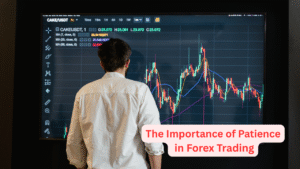 The Importance of Patience in Forex Trading: Why Waiting Pays Off
The Importance of Patience in Forex Trading: Why Waiting Pays Off
In the fast-paced world of Forex trading, patience is often overlooked yet it is one of the most valuable traits a trader can develop. Many beginners fall into the trap of impulsive trading — jumping into the market without proper analysis or chasing quick profits.
However, Forex trading rewards those who wait for the right setups and exercise discipline. This article explores why patience is critical in Forex trading, the dangers of impatience, and practical tips for cultivating patience to improve your trading results.
Why Patience Matters in Forex Trading
Patience helps traders:
- Avoid entering poor trades based on emotion or impatience
- Wait for high-probability setups that fit their strategy
- Allow trades enough time to develop and reach their targets
- Maintain emotional balance, reducing stress and burnout
- Stick to their trading plan without deviation
Without patience, traders often overtrade, take unnecessary risks, and suffer from losses that could have been avoided.
The Dangers of Impatience in Forex Trading
1. Chasing the Market
Impatient traders frequently enter trades late, chasing price movements that have already run their course.
Result: Increased risk of entering at poor prices and suffering losses.
2. Exiting Trades Too Early
Fear of losing or eagerness to lock in profits causes some traders to close positions prematurely, missing out on larger gains.
Result: Reduced profitability and inconsistent results.
3. Overtrading
Impatience can lead to making too many trades in a short time to “make up” for losses or boredom.
Result: Higher transaction costs, increased risk, and poor decision-making.
4. Ignoring Your Trading Plan
Impatient traders tend to deviate from their plan, entering trades that don’t meet their criteria or risking more than intended.
Result: Lack of consistency and increased losses.
How to Cultivate Patience in Forex Trading
1. Develop a Solid Trading Plan
A well-defined trading plan with clear entry, exit, and risk management rules helps you wait for the best setups and avoid impulsive trades.
2. Use Alerts and Automation
Set price alerts to notify you when your trade criteria are met. Consider automated orders like stop-losses and take-profits to reduce emotional interference.
3. Practice Mindfulness and Stress Management
Techniques like meditation, deep breathing, and regular breaks improve emotional control and reduce the urge to trade impulsively.
4. Focus on Quality, Not Quantity
Trade fewer setups but with higher probability. Remember, one well-planned trade is better than ten impulsive ones.
5. Keep a Trading Journal
Document your trades and emotions. Review instances where impatience led to poor decisions to learn and improve.
Examples of Patience Paying Off in Forex Trading
- Waiting for Confirmation:
A trader spots a potential breakout but waits for a candle close above resistance before entering. This patience avoids false breakouts. - Allowing Trends to Develop:
Instead of closing a trade too early on small profits, patient traders ride the trend for maximum gains. - Avoiding Trading During Uncertainty:
During unclear market conditions, patient traders stay on the sidelines instead of forcing trades.
Final Thoughts
Patience is not passive waiting — it’s an active skill that requires discipline, planning, and self-awareness. Developing patience transforms your trading from gambling into a structured, strategic process.
By embracing patience, you’ll improve your entry timing, reduce emotional mistakes, and increase your chances of consistent profitability.
Remember, in Forex trading, waiting often pays off more than rushing.
FAQs
1. How can I tell if I’m being impatient while trading?
If you’re entering trades without proper setup or frequently closing trades early, impatience may be a factor.
2. Does patience mean missing opportunities?
No. Patience means waiting for high-probability setups, which improves overall success rate.
3. How long should I wait before entering a trade?
Wait until your trading criteria are met, which varies by strategy — from minutes (scalping) to days (swing trading).
4. Can meditation really help with trading patience?
Yes. Meditation improves focus and emotional control, which helps resist impulsive decisions.
5. What if I get bored waiting?
Use the waiting time to review charts, study, or plan your next moves rather than forcing trades.
